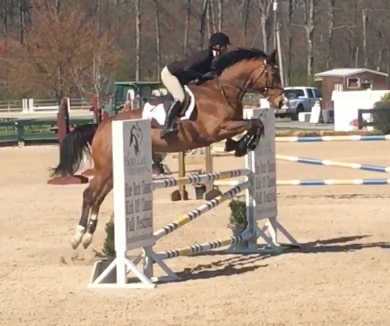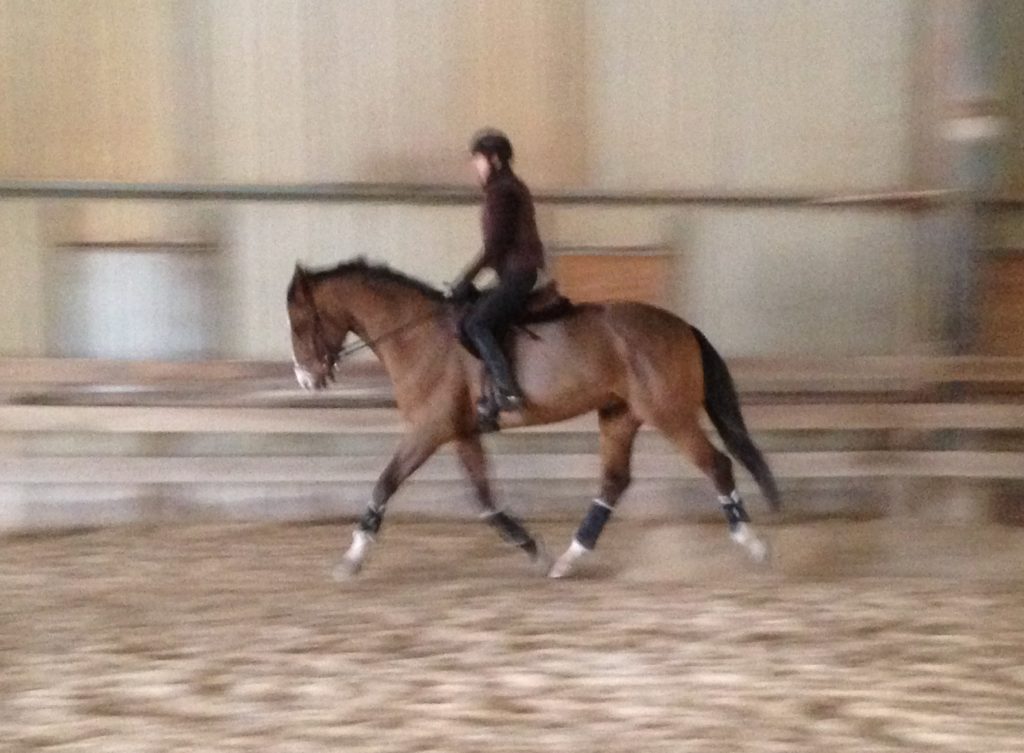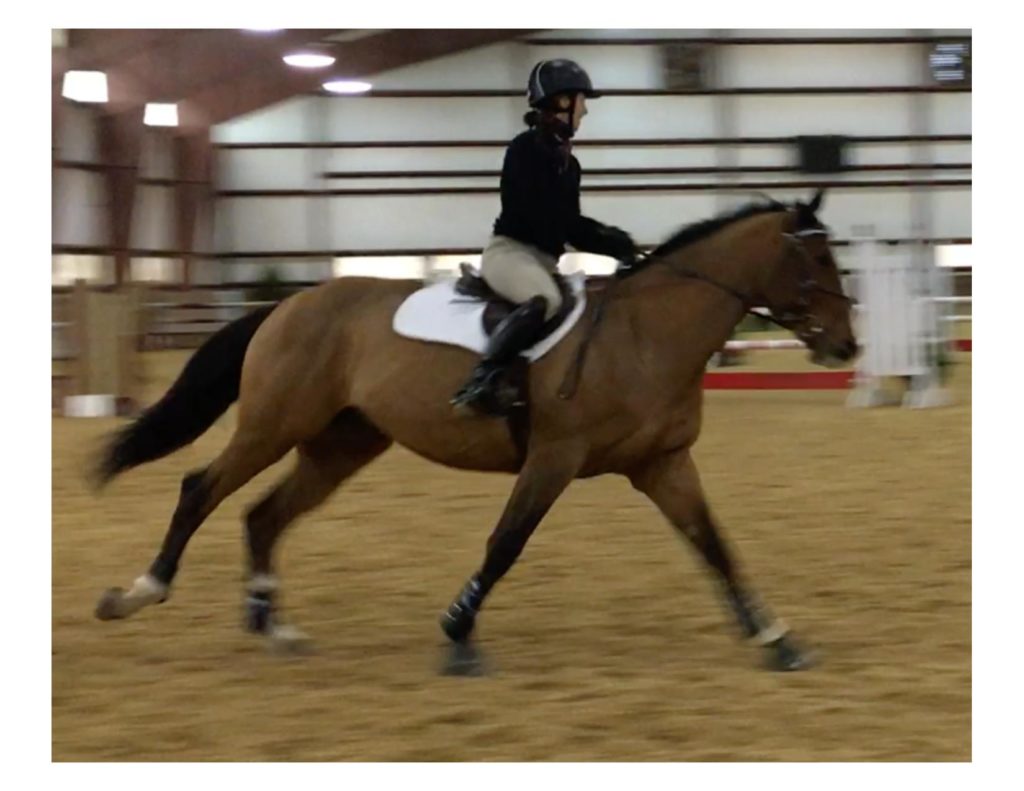“You cannot be afraid to fail.”
— Packy McGaughan, giving me life lessons over fancy pizza.
Last summer, mid-2019, Stevie and I were on a roll. We had successfully moved up a level to the Low A/O Jumpers, which is 1.20-1.25m. To be honest, the stuff we were jumping at home was quite a bit bigger and more challenging than the handful of smaller shows we’d tackled, but Steve was jumping great and I was feeling very confident about our chances of becoming competitive at that level by the end of the year in bigger shows.
A very nice eventing venue a couple of hours from our barn has occasional schooling days set up like events, with the option of just doing a round or two in their show jumping ring. I love jumping in that ring; the courses are challenging but fair, and the schooling opportunity is unbeatable. They offered one of these events mid-summer, so I signed us up for the Intermediate height, which is 1.20m. Everything was lined up for a fun afternoon!
 Photo by Jaime Loichinger.
Photo by Jaime Loichinger.
Except, it all went wrong. My friend/trainer competing in the same division and I arrived late due to unexpected issues back at the barn, and as these things follow eventing format, we had specific ride times, so we needed to be in the ring when they called us. I threw on Steve’s tack and scrambled into the saddle, heading to the warm up ring to get a few jumps under our belt. As I was trotting up there, the gate person called me. YIKES. I warmed up very quickly on the flat and started to jump, at which point I was being told I had to go into the ring or forfeit my entry. Yes, I was That Guy: That Jumper Person who can’t get herself into the ring on time. Suffice it to say, we didn’t warm up enough and had jumped maybe a 3’ fence or two. I was nervous. Steve was nervous. Things were going great! Ugh.
When we got in the ring, Steve and I looked around and we both thought: Uh oh. This was a BIG course. It was a legit Intermediate stadium round, and it was maxed out. Suffice it to say that we were not ready, I failed to keep him forward and balanced to just about everything, and we ended up repeating not just a fence or two but the whole thing. A couple of times. It was a disaster, and by the end I think if Steve had been able to drive himself home, he would have happily left me there.
After that, it took a while—a month or so of back to basics confidence-building—before Steve trusted me and I trusted myself again at that height. We call him Simply Steven: he is very straightforward and as long as he thinks I know what I am doing, he will jump a house for me. If I make him worried about my decisions, then all bets are off. Steve hates touching anything and always tries his hardest, so putting him in a situation where he has to climb his way over the jump is extremely unfair. Can you tell I felt really guilty about repeatedly putting him in that situation? Anyway, he forgave and forgot (Simply Steven!) and I resolved to ride better and not let my nerves do that to me or my horse ever again.
 Photo by Jaime Loichinger.
Photo by Jaime Loichinger.
All of this sent me down an interesting path where I wanted to get a sense of how different riders view confidence. I started casually interviewing people I know, mostly ammies who event, asking them simple questions about what makes them feel confident, what helps restore it when lost, and so on. I asked the pros I talked with the same questions, as well as how they help students who are struggling.
Here are a few thoughts I collected from my interviewees:
“The head game is the majority of it for me. Is this voice in your head good or bad? I feel confident when I am prepared in all aspects: did I get enough sleep, have I walked the course, do I know where I am going? For my students, it is a fine line between making confidence and over-facing and destroying confidence. How challenging is their show prep? Is it too much, or not enough? What is the horse’s confidence level for the student? Do I need to ride it before a competition to help them out?” — Pro in late-20s, currently competing at FEI 2* level
“Confidence is having trust in the horse, working together, trusting each other in new or scary situations. When I lose my confidence it is all mental, not physical. It helps when my trainer knows I’m capable, so I need to have confidence in my trainer. It also helps if the horse is willing. Then I can just do it and get it over with. I am a perfectionist, so I have show nerves. A drink usually helps!” — Ammy, late 40s, currently competing in Beginner Novice (0.80m) with young horse
“It is a mind game! The trainer is important, because fear is a result of confidence disappearing.” — Ammy, early 20s, beginner rider
“The horse and the trainer help me face my fears. I had a very bad fall and that erased everything good. It’s physical because my fear of falling off keeps me from being able to go for it.” — Ammy, mid-40s, riding Beginner Novice
“Confidence is being able to do something without fear. It’s mental, entirely, before a competition. My trainer helps by talking about it, walking me through everything. Over-thinking makes me lose confidence. The horse can help or hurt, too.” — 19 year old ammy rider with a green horse
“Confidence is riding my plan without letting my nerves change it. During a competition is where it all falls apart. I can restore confidence myself, though; competing is a muscle. The more you do it, the easier it is to get back on track. I know my horse really well, and that helps. I hear my trainer’s voice in my head, telling me I am fine. Having some bubbly and using essential oils before I go in helps, too!” — Ammy, late 30s, competing in Beginner Novice
“Confidence is challenging myself to do new things, connecting with the horse, and being the best version of myself I can be. When my back hurts, I lose confidence. But it gets better if I can push through it. I try to be nice to myself, but I don’t want to mess up my horse. Quiet time in my trailer before I compete helps me center myself.” — Ammy, late 40s, competing Training (1.0m)
 Photo by Jaime Loichinger.
Photo by Jaime Loichinger.
And so on. Confidence is a tricky thing, isn’t it? One of my worst fears is that I will ruin my very nice horse by riding poorly; in turn, this can make me ride poorly! I am quite brave in many ways, but it is situational. As my friend Packy put it when I talked with him, our idea of what is difficult and hard comes from our understanding of what our horses can do and how this will stack up in competition. As he said: “If you know you are supposed to be there, you’ve passed a threshold. You don’t compete unless you know your horse can do it. A lack of confidence in your horse will make you ride wrong. You cannot be afraid to fail.”
Is confidence knowing you will win? I don’t think so, although I do love to win. For me, it is knowing that I am prepared and that I have done my very best to be fair to my horse in what I ask him to do. I am afraid to fail; I am a perfectionist, and boy do we hate failure. What I have said to myself is: I will not let it stop me.
What makes you confident?
